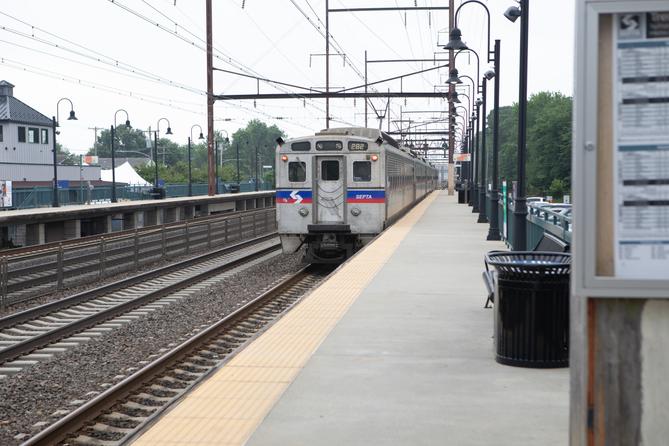HARRISBURG — Democrats in the Pennsylvania House are fast-tracking a bill to send more money to the state’s transit agencies with provisions designed to win Republican support as SEPTA sets a deadline for the legislature to act.
The Philadelphia-area agency said Wednesday that the legislature must approve more funding by Aug. 14 or it would move forward with its first stage of fare hikes and service cuts. It’s one of many public transit agencies on the brink of deep service cuts due to factors including the end of federal pandemic aid.
The proposal would increase the amount of state sales tax revenue transferred to public transit by 1.75 percentage points, in line with previous pitches from Democratic Gov. Josh Shapiro and other members of his party.
But in a bid to meet GOP demands, it would also approve $600 million in bonds to fund road construction, about half of which would be earmarked for rural areas, and add new accountability standards, including tracking large agencies' enforcement of fare evasion. Failure to meet these standards could cost the agencies their state operating aid.
“The only issue remaining is: will senators allow their leaders to hold Pennsylvania’s economy and the livelihoods of millions hostage?” Democratic leadership in the state House said in a statement Wednesday.
The lower chamber’s Transportation Committee passed the bill 16-10, with bipartisan support. Democratic leaders could bring it up for a final floor vote within three days of lawmakers returning to Harrisburg.
“We have been debating this issue for over two years,” state Rep. Sean Dougherty (D., Philadelphia) said. “We are out of time. My neighbors are out of time.”
In a statement, state Senate Majority Leader Joe Pittman (R., Indiana) said he met with Shapiro on Tuesday and continues “to be optimistic that consensus on a responsible budget can be reached.” He did not address transit specifically.
“Our Senate Republican Caucus is focused on substantive actions and advancing fiscally responsible measures to address the needs of individuals and families across the commonwealth,” he added.
Deep disagreements in the divided Capitol over the state’s finances have dragged out closed-door budget talks more than a month past the statutory June 30 deadline, with no end in sight.
The commonwealth has roughly $11 billion in financial reserves, but those dollars could quickly disappear as public health care, education, and transit needs grow. The Pennsylvania Constitution requires the state to have a balanced budget, and the legislature has struggled in recent years to agree on new sources of revenue or make cuts.
Looming federal spending cuts for many state-run programs, including Medicaid for health care and SNAP for food aid, included in President Donald Trump’s major tax law have only exacerbated the debate.
The stakes are high. Transit agencies across the state, including in Philadelphia and Pittsburgh, have warned that they will cut routes and hike fares without new funding. The combination, experts say, could kick off a death spiral for agencies as riders find alternatives to less reliable, more expensive service.
Republicans who control the state Senate have argued that more transit funding should be accompanied by a dedicated funding stream, such as taxing slot-like skill games, and more money for roads and bridges. They’ve also questioned if SEPTA and other agencies are doing enough to tackle public nuisances on transit or using their resources effectively.
“We do need to ask these public transit authorities to make sure that they are doing everything administratively to keep costs down,” state Senate President Pro Tempore Kim Ward (R., Westmoreland) said on a Philadelphia radio program Tuesday, according to City & State PA.
The Senate has yet to vote on legislation to accomplish any of their terms for a transit deal. But the new state House proposal tackles their accountability concerns.
Pulling from legislation introduced by a Republican state senator, the bill would allow PennDOT to issue regulations setting “additional minimum system performance criteria for an applicable authority to improve fare evasion, public-private transportation partnerships and bus routes.” The regulations would only apply to SEPTA and Pittsburgh Regional Transit.
State Sen. Joe Picozzi (R., Philadelphia) told Spotlight PA in June that he was developing the language with SEPTA management to respond to his caucus’ concerns.
His bill and the state House measure would push transit agencies to develop unused land and allow video billboards on the sides of buses. These measures, Picozzi argued, would provide agencies with some additional funding and give them skin in the game.
“We need to show the people I represent and people my colleagues represent that this is an investment in this system that's going to get better [and] that we're not going to be sitting here in five years in the same exact spot,” he said.
Neither the state House nor Senate is scheduled to return to Harrisburg for voting sessions until next month, although that could change at any time.
While Shapiro and other legislative leaders have been optimistic in public about the progress of the budget, lobbyists and staff have been less so privately.
Instead of agreeing now to a full-year budget, lawmakers could adopt a short-term, six-month deal, something Ward, the top state Senate leader, says she is open to. However, other dealmakers from both parties have previously downplayed such an option.
